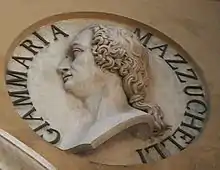Giammaria Mazzucchelli
Count Giammaria Mazzuchelli (or Giovanni Maria Mazzucchelli) (28 November 1707 – 19 November 1765) was an Italian writer, bibliographer and historian.
Giammaria Mazzuchelli | |
|---|---|
 Portrait of Giammaria Mazzuchelli in Brescia | |
| Born | 28 November 1707 Brescia, Italy |
| Died | 19 November 1765 (aged 57) Brescia, Italy |
Biography
Mazzuchelli was the son of Count Federico Mazzuchelli (it., Brescia, 1671–1746) and Margaret Muzzi. Due to poor health during early childhood, he studied at first with a private tutor. He continued his studies in Bologna, where he studied under Francesco Saverio Quadrio, and later in Padua, where he studied under Domenico Lazzarini, where he graduated in 1728. In the same year, he married Barbara Chizzoli, an heiress whose dowry allowed him to devote himself to historical studies. Mazzucchelli's father bought the Moggi's sixteenth-century family house,[1] located between Brescia and Lake Garda, in 1722, and added the central building and the west wing some time later. Giammaria completed the construction in 1753, as stated on the memorial tablet set between the pronaos' central door architrave and the tympanum.
Works

He began with numerous scholarly and accurate biographies of ancient and more modern authors, e.g., Archimedes, Pietro Aretino,[2][3] Lodovico Adimari,[4] Alamanni Luigi, Matteo and Filippo Villani[5]). From this experience, he conceived an ambitious plan to collect biographies of all the writers of Italy from the earliest times, including the history of their works. In this endeavor, he relied on the Queriniana library in Brescia, donated by the Cardinal Angelo Maria Quirini, and his extensive correspondence with the scholars of Italy and Europe. He began to compile a dictionary of great writers of Italy, but the work remained unfinished because of his untimely death.[6] However, Mazzuchelli opened the way to the history of Italian literature, recognized by Girolamo Tiraboschi in the Introduction of his greatest work,[7] and subsequent historians. Much of Mazzuchelli's unpublished material is still in manuscript form in the Vatican Library. A copy is also in the collection of the Biblioteca Nazionale Centrale di Roma.
Notes
- Mazzucchelli Villa Museum
- Giammaria Mazzuchelli, Pietro Aretino's life written by Count Giammaria Mazzuchelli Brescia, Padova, following Giuseppe Comino , 1741
- Giammaria Mazzuchelli, Pietro Aretino's life written by Count Giammaria Mazzuchelli Brescia, decorated with seven tables , Milan, and Francesco Sonzogno Comp Contrada della Spiga, P. New, no. 1395, 1830.
- Adimari Louis, satirist Marquis Lodovico Adimari Florentine nobleman, the second edition which adds a eulogy of the author taken from the clear Count Giammaria Mazzucchelli , Amsterdam, 1764.
- Giammaria Mazzuchelli, Cronica di Matteo and Filippo Villani, the Florentine Lives of illustrious men of Philip and the Chronicle of Dino Compagni , Milan, Nicolò Bettoni and Company, 1834.
- Giammaria Mazzuchelli, Writers of Italy, that is, historical news and criticism about the lives and writings of the Italian literati, Brescia, Bossini, 1753–1763.. Vol I, Part 1 , Vol I, Part 2 , Vol II, Part 1 , Vol II, Part 2 , Vol II, Part 3 Vol II Part 4
- Girolamo Tiraboschi, History of Italian Literature by Girolamo Tiraboschi, the Society of Jesus, librarian of the Most Serene Duke of Modena, Modena, at the printing company, 1772–1782.
References
- "Mazzuchelli (Count Giovanni Maria)." In: Louis-Maïeul Chaudon, Nouvelle Dictionnaire Historique, Michele Morelli, 1791. Volume XVII, pp. 407–410 (Google Books)